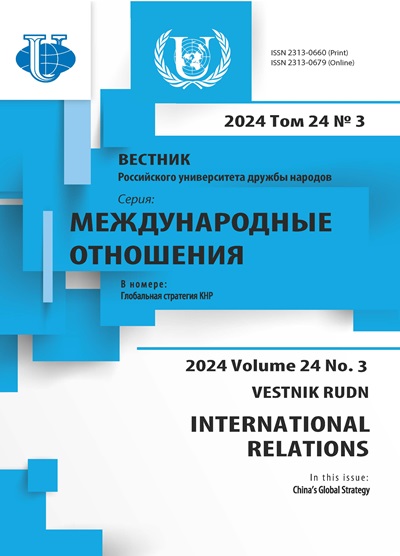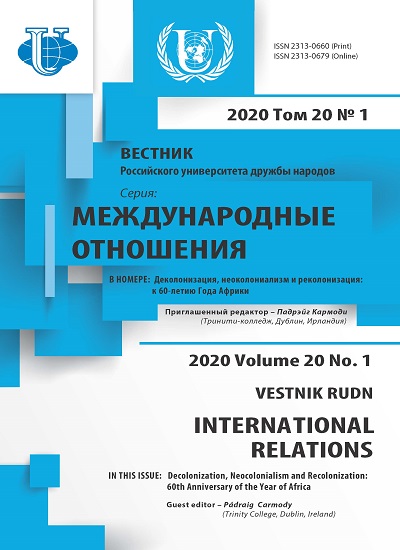60 лет спустя: незавершенная деколонизация Африки
- Авторы: Тэйлор Я.1
-
Учреждения:
- Университет Сент-Эндрюс
- Выпуск: Том 20, № 1 (2020): Деколонизация, неоколониализм и реколонизация: к 60-летию Года Африки
- Страницы: 39-53
- Раздел: ТЕМАТИЧЕСКОЕ ДОСЬЕ
- URL: https://journals.rudn.ru/international-relations/article/view/23321
- DOI: https://doi.org/10.22363/2313-0660-2020-20-1-39-53
Цитировать
Полный текст
Аннотация
1960 год, ознаменованный тем, что число формально независимых африканских стран на континенте возросло с 9 до 26, стал символом наступления новой эпохи - освобождения Африки от европейской колонизации. Однако с самого начала очень немногие африканские лидеры стремились по-настоящему реорганизовать экономические модели и практически не ставили под сомнение внешние экономические отношения африканских стран. Они предпочитали играть роль компрадоров, оставаясь преданными своим бывшим колониальным хозяевам. Соответственно, спустя 60 лет после Года Африки большинство африканских стран по-прежнему укоренены в системе отношений, которая хорошо соответствует определению неоколониализма в трактовке Кваме Нкрумы. Этот неоколониализм сохраняет устойчивую материальную базу, что позволяет поддерживать подчиненный статус континента в мире и его отсталость. Устойчивый рост и развитие в Африке нивелируется доминированием экономической модели, ориентированной на экспорт. Африканские страны все также ограничены в накоплении необходимого капитала для обеспечения эндогенного роста, поскольку основные доходы переводятся за границу. Асимметричные экономические отношения воплощаются в непрекращающемся превосходстве стран мирового ядра над Африкой, что внутренне присуще капитализму. Неравноценный обмен, вывод доходов за рубеж, то есть продолжающееся разграбление Африки ее элитами и их иностранными партнерами означает, что мечты и чаяния 1960 г., по крайней мере для большинства африканцев, остались нереализованными.
Ключевые слова
Об авторах
Ян Тэйлор
Университет Сент-Эндрюс
Email: ict@st-andrews.ac.uk
доктор философии, профессор по международным отношениям и африканской политэкономии, Университет Сент-Эндрюс, Великобритания; экстраординарный профессор, Стелленбосский университет, ЮАР; заведующий кафедрой, Школа международных исследований, Китайский народный университет Шотландия, Великобритания
Список литературы
- Amin, S. (1973). Neocolonialism in West Africa. Harmondsworth: Penguin Books.
- Amin, S. (1974). Accumulation on a World Scale. New York: Monthly Review Press.
- Amin, S. (1976). Unequal Development: An Essay on the Social Formations of Peripheral Capitalism. New York: Monthly Review Press.
- Amin, S. (1977). Imperialism and Unequal Development. Sussex: Harvester Press.
- Amin, S. (2003). Obsolescent Capitalism: Contemporary Politics and Global Disorder. London: Zed Books.
- Amin, S. (2008). “Market Economy” or Oligopoly-Finance Capital. Monthly Review, 59 (11), 51-61.
- Amin, S. (2019). The New Imperialist Structure. Monthly Review, 71 (03). doi: 10.14452/MR-071-03-2019-07_3
- Anievas, A. & Nişancıoğlu, K. (2015). How the West Came to Rule: The Geopolitical Origins of Capitalism. London: Pluto Press.
- Bagchi, A. (1982). Political Economy of Underdevelopment. Cambridge: Cambridge University Press.
- Baran, P. & Sweezy, P. (1966). Monopoly Capital: An Essay on the American Economic and Social Order. New York: Monthly Review Press.
- Baran, P. (1957). The Political Economy of Growth. New York: Monthly Review Press.
- Brenner, R. (2006). What Is, and What Is Not, Imperialism? Historical Materialism, 14 (04), 79-105. doi: 10.1163/156920606778982464
- Cox, R. (1987). Production, Power and World Order: Social Forces in the Making of History. New York: Columbia University Press.
- Dosman, E. (2008). The Life and Times of Raúl Prebisch, 1901-1986. Montreal: McGill-Queen’s University Press.
- Emmanuel, A. (1972). Unequal Exchange: A Study of the Imperialism of Trade. New York: Monthly Review Press.
- Emmanuel, A. (1974). The Myths of Development Versus “Myths of Underdevelopment”. New Left Review, 85, 61-82.
- Emmanuel, A. (1975). Unequal Exchange Revisited. IDS Discussion Paper, 77. Brighton: University of Sussex.
- Engels, F. (1872/2011). The Housing Question. In: Marx, K. & Engels, F. Karl Marx and Frederick Engels Selected Works. Vol. 2. New Delhi: People’s Publishing House.
- Engels, F. (1881/2010). The Future Results of British Rule in India. In: Marx, K. & Engels, F. Marx and Engels Collected Works. Vol. 24. London: Lawrence and Wishart.
- Evans, D. (1976). Unequal Exchange and Economic Policies: Some Implications of Neo-Ricardian Critique of Theory of Comparative Advantage. Economics and Political Weekly, 11 (5/7), 143-158.
- Foster, J. (2006). Monopoly-Finance Capital. Monthly Review, 58 (07), 1-14.
- Frank, A. (1972). The Development of Underdevelopment. In: Cockcroft, J.D., Frank, A.D. & Johnson, D. (Eds.). Dependence and Underdevelopment. New York: Anchor Books.
- Gemmill, R. (1962). Prebisch on Commercial Policy for LDCs. Review of Economics and Statistics, 44 (02), 198-201.
- Ghosh, J. (2019). A Brave New World, or the Same Old Story with New Characters? Development and Change, 50 (02), 379-393.
- Glaser, A. & Smith, S. (1992). Ces messieurs Afrique 1: Le Paris-village du continent noir. Paris: Calmann-Lévy.
- Gramsci, A. (1971). Selections from the Prison Notebooks. London: Lawrence and Wishart.
- Hayter, T. (1981). The Creation of World Poverty. London: Pluto Press.
- Higginbottom, A. (2014). “Imperialist rent” in Practice and Theory. Globalizations, 11 (01), 23-33.
- Hobsbawm, E. (1994). The Age of Extremes: The Short Twentieth Century, 1914-1991. London: Michael Joseph.
- Jalée, P. (1968). The Pillage of the Third World. New York: Monthly Review Press.
- Jalée, P. (1977). How Capitalism Works. New York: Monthly Review Press.
- Khamisi, L. (1981). Imperialism Today: A Contribution to the University of Dar es Salaam Debate. Dar es Salaam: Tanzania Publishing House.
- Lenin, V. (1897/1981). A Characterisation of Economic Romanticism. Moscow: Progress publ. (In Russian).
- Lenin, V. (1899/1977). Our Programme. In: Lenin: Selected Works. Moscow: Progress publ. (In Russian).
- Lenin, V. (1914/1935). The Teachings of Karl Marx. In: Burns, E. (Eds.) Handbook of Marxism. London: Victor Gollancz.
- Lenin, V. (1916/1977). The Discussion on Self-Determination Summed Up. In: Lenin, V.I. Collected Works. Vol. 22. Moscow: Progress Publishers.
- Luxemburg, R. (1913/1951). The Accumulation of Capital. London: Routledge & Kegan Paul.
- Marx, K. & Engels, F. (1846/2015). The German Ideology. New Delhi: People’s Publishing House.
- Marx, K. & Engels, F. (1848/2004). Manifesto of the Communist Party. Beijing: Foreign Languages Press.
- Marx, K. (1867/1977). Capital: A Critique of Political Economy. Vol. 1. Moscow: Progress publ. (In Russian).
- Marx, K. (1894/1986). Capital: A Critique of Political Economy. Vol. 3. Moscow: Progress publ. (In Russian).
- Nkrumah, K. (1965). Neocolonialism: The Last Stage of Imperialism. New York: International Publishers.
- Patnaik, P. (1986). Lenin and Imperialism: An Introduction. In: Patnaik, P. (Eds.) Lenin and Imperialism: An Appraisal of Theories and Contemporary Reality. London: Sangam Books.
- Patnaik, P. (2008). The Accumulation Process in the Period of Globalisation. Economic & Political Weekly, 43 (26/27), 108-113. doi: 10.2307/40278907
- Patnaik, U. (2007). The Republic of Hunger and Other Essays. Monmouth: Merlin Press.
- Prebisch, R. (1950). The Economic Development of Latin America and its Principal Problems. New York: UN Department for Economic Affairs.
- Ricci, A. (2019). Unequal Exchange in the Age of Globalization. Review of Radical Political Economics, 51 (03), 225-245. doi: 10.1177/0486613418773753
- Rodney, W. (1972). Problems of Third World Development: A Discussion of Imperialism and Underdevelopment. Ufahamu, 3 (02), 27-47.
- Rodney, W. (1972/2018). How Europe Underdeveloped Africa. London: Verso Books.
- Rweyemamu, J. (1973). Underdevelopment and Industrialization in Tanzania. Oxford: Oxford University Press.
- Rweyemamu, J. (Eds.). (1980). Industrialization and Income Distribution in Africa. Dakar: CODESRIA.
- Sankara, T. (2007). Thomas Sankara Speaks: The Burkina Faso Revolution, 1983-1987. New York: Pathfinder Press.
- Sau, R. (1978). Unequal Exchange, Imperialism and Underdevelopment: An Essay on the Political Economy of World Capitalism. Calcutta: Oxford University Press.
- Shivji, I. (2009). Accumulation in an African Periphery: A Theoretical Framework. Dar es Salaam: Mkuki na Nyota Publishers.
- Shivji, I. (2019). Whither Africa in the Global South? Lessons of Bandung and Pan-Africanism. In: Moyo, S., Jha, P. & Yeros P. (Eds.). Reclaiming Africa: Scramble and Resistance in the 21st Century. Berlin: Springer. doi: 10.1007/978-981-10-5840-0
- Singer, H. (1950). The Distributions of Gains Between Investing and Borrowing Countries. American Economic Review, 40 (02), 473-485.
- Sutcliffe, R. (1971). Industry and Underdevelopment. London: Addison-Wesley.
- Taylor, I. (2017). Global Governance and Transnationalising Capitalist Hegemony: The Myth of the “Emerging Powers”. London: Routledge.
- Terreblanche, S. (2014). Western Empires, Christianity and the Inequalities between the West and the Rest. London: Penguin Books.
- Tschannerl, G. (1976). Periphery Capitalist Development: A Case Study of the Tanzanian Economy. Utafiti, 1 (01), 5-46.
- Vershave, F.-X. (2003). Francafrique: la plus long scandale de la republique. Paris: Stock.
- Williams, G. (1982). Hegemony, War of Position and Political Intervention. In: Showstock-Sassoon, A. (Eds.). Approaches to Gramsci. London: Writers and Readers.











